

DEFINITIONS OF COMMUNITY: AREAS OF AGREEMENT.: EBSCOhost. Category:Intentional communities. Catégorie:Communauté intentionnelle. 1 s2.0 S1822801115000028 main. Dr. Michael Livni. המכון לחקר הקיבוץ הדפסה המכון לחקר הקיבוץ והרעיון השיתופי - Home. The institute is an expression of scientific collaboration between the kibbutz movement and the university of Haifa.
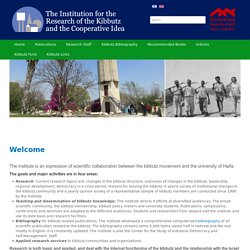
The goals and major activities are in four areas: Research: Current research topics are: changes in the kibbutz structure, outcomes of changes in the kibbutz, leadership, regional development, democracy in a crisis period, reasons for leaving the kibbutz. A yearly survey of institutional changes in the kibbutz community and a yearly opinion survey of a representative sample of kibbutz members are conducted since 1990 by the institute. Teaching and dissemination of kibbutz knowledge; The institute directs it efforts at diversified audiences: The broad scientific community, the kibbutz membership, kibbutz policy makers and university students. Publications, symposiums, conferences and seminars are adapted to the different audiences. Research is both basic and applied, and deal with the internal functioning of the kibbutz and the relationship with the Israel society. 59289434. A Matter of Definition: Just What is an Intentional Community?: EBSCOhost.
Du local au mondial, Alternatives rurales et luttes paysannes. Gemeinschaft Sennrüti – Zusammen auf Entdeckungsreise. Quels leviers pour favoriser un changement d'échelle des membres d'Après-Ge ? ANNICK DELORME , Un modele alternatif d'insertion : etude d'experiences de vie communautaire en europe. Social inclusion is often understood as a compulsory process, unique which is imposed to the excluded people : widely deprived of any possibility of action and negociation, the individual is forced to enter into a process he does not choose and control, although this conception of social inclusion is mainly accepted, it is possible to consider it in a different way, as a support to the individual initiative and action and which gives to the excluded people basic conditions to construct themselves as actors, subjects (a.
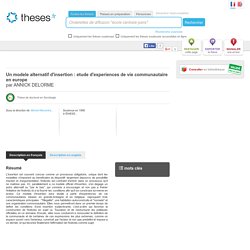
Touraine). We have studied this new conception of social inclusion through communautarian experiences situated in great-britain and belgium, and meeting three main characteristics : illegality, a nomad dwelling (bender, bus. . . ) and a communautarian way of life. Firstly, these experiences help us to define social inclusion as a subjective process (refering to a. Touraine's definition of the subject) and to consider differentely social politics.
Le processus d'individualisation en situation de précarité : deux communautés de New Age Travellers en Grande-Bretagne. Notes Nous utiliserons indifféremment le terme de Travellers ou de New Age Travellers (NATs) pour évoquer la population étudiée.
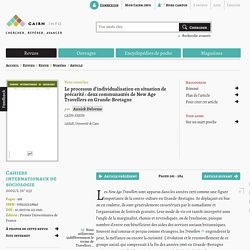
Cet article repose principalement sur une étude menée entre le milieu et la fin des années 1990 en Grande-Bretagne et dont les données ont été actualisées. U. Dr. Dieter Duhm und Sabine Lichtenfels – Gemeinschaften als Heilungsbiotope – Lebensenergie-Konferenz. Heilung der Liebe Dr.
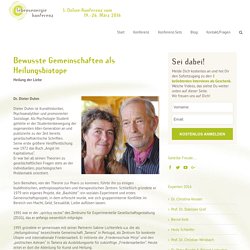
Dieter Duhm Dieter Duhm ist Kunsthistoriker, Psychoanalytiker und promovierter Soziologe. Als Psychologie-Student gehörte er der Studentenbewegung der sogenannten 68er-Generation an und publizierte zu der Zeit bereits gesellschaftskritische Schriften. Seine erste größere Veröffentlichung war 1972 das Buch „Angst im Kapitalismus“. Sein Bemühen, von der Theorie zur Praxis zu kommen, führte ihn zu einigen buddhistischen, anthroposophischen und therapeutischen Zentren. 1991 war er der „spiritus rector“ des Zentrums für Experimentelle Gesellschaftsgestaltung (ZEGG), das er anfangs wesentlich mitprägte. 1995 gründete er gemeinsam mit seiner Partnerin Sabine Lichtenfels u.a. die als „Heilungsbiotop“ bezeichnete Gemeinschaft „Tamera“ in Portugal, als Zentrum für konkrete Utopie und internationale Friedensarbeit.
Auf Grundlage verschiedenster Konzepte wie z.B. Ithaca's EcoVillage cohousing community. Living in the Future - LAMMAS Trailer. Seed Communities: Ecovillage Experiments Around the World. About the Author – Ecovillages: Lessons for Sustainable Community. Karen Litfin, Ph.D. is a professor of political science and environmental studies at the University of Washington.
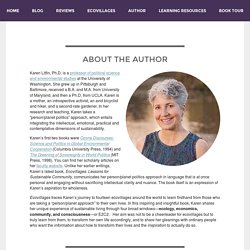
She grew up in Pittsburgh and Baltimore, received a B.A. and M.A. from University of Maryland, and then a Ph.D. from UCLA. Karen is a mother, an introspective activist, an avid bicyclist and hiker, and a second-rate gardener. In her research and teaching, Karen takes a “person/planet politics” approach, which entails integrating the intellectual, emotional, practical and contemplative dimensions of sustainability.
Karen’s first two books were Ozone Discourses: Science and Politics in Global Environmental Cooperation (Columbia University Press, 1994) and The Greening of Sovereignty in World Politics (MIT Press, 1998). You can find her scholarly articles on her faculty website. Ecovillages traces Karen’s journey to fourteen ecovillages around the world to learn firsthand from those who are taking a “person/planet approach” to their own lives. Surviving Conflict New Zealand's Intentional Communities: EBSCOhost. Béatrice Mésini, la coproduction des savoirs : ensemencement et hybridation terrain/théorie.
Nicole Mathieu (NSS) : Vous suivez depuis de nombreuses années avec un réel engagement de recherche les mouvements sociaux alternatifs sur les scènes locales, nationales et plus particulièrement mondiales.
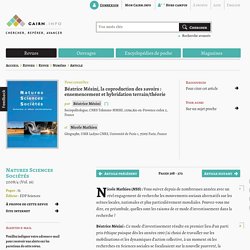
Pouvez-vous me dire, en préambule, quelles sont les raisons de ce mode d’investissement dans la recherche ? Béatrice Mésini : Ce mode d’investissement résulte en premier lieu d’un parti pris éthique puisque dès les années 1990 j’ai choisi de travailler sur les mobilisations et les dynamiques d’action collective, à un moment où les recherches en Sciences sociales se focalisaient sur la nouvelle pauvreté, la galère, la disqualification, la misère et l’exclusion. Il est aussi en partie le fruit d’un hasard puisque recrutée au CNRS en 1996 sur mon thème des « Résistances à l’exclusion dans les villes et les campagnes », j’ai privilégié les enquêtes en milieu rural, espace qui me semblait progressivement déserté par les chercheurs, surtout par les sociologues.